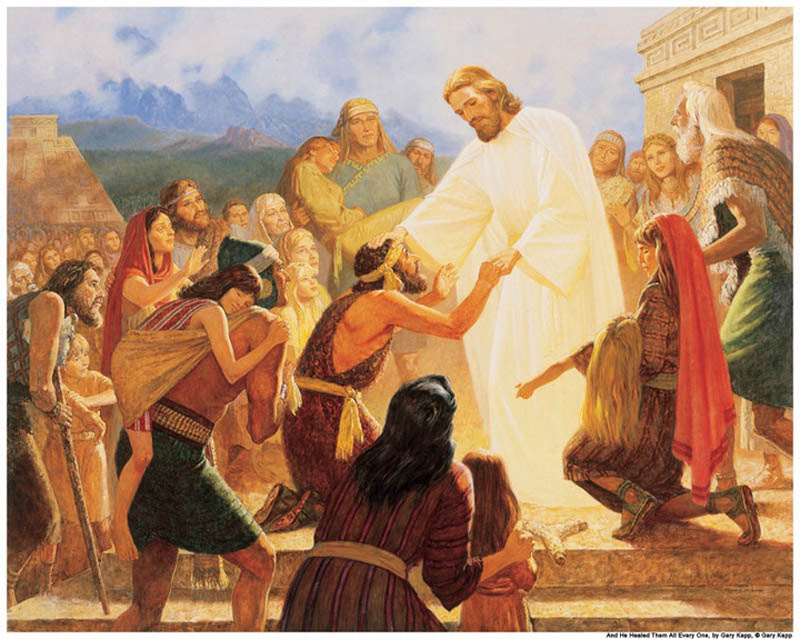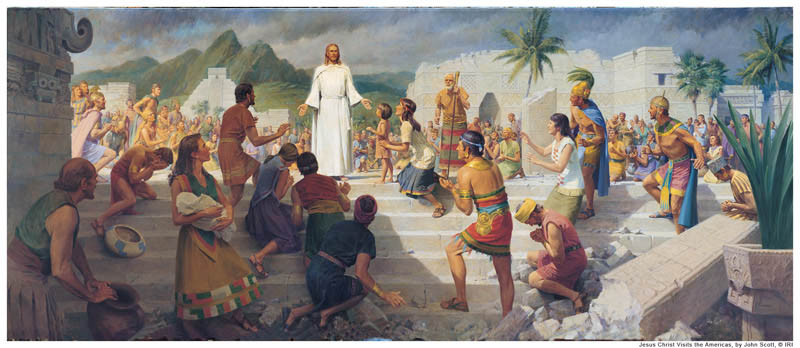 We have been exploring a small percentage of the teachings on Jesus Christ in the Book of Mormon. In these first articles, we have followed the family of a prophet named Lehi, born in Jerusalem, who followed God’s command to take his family to what is now known as the American continent around 600 BC.
We have been exploring a small percentage of the teachings on Jesus Christ in the Book of Mormon. In these first articles, we have followed the family of a prophet named Lehi, born in Jerusalem, who followed God’s command to take his family to what is now known as the American continent around 600 BC.
In 2 Nephi, chapter 2, Lehi is about to die. They are living in their new home and the family is troubled. The two oldest sons, Laman and Lemuel, have gone from being rebellious teens to wicked adults, even trying to kill their younger brother Nephi. Others in the family, which includes spouses, the father of the spouses, and one person who chose to come with them, had also chosen wickedness. Some, however, were devout followers of God.
Two more children had been born into the family under challenging circumstances. As Lehi is dying, he calls each child in to speak with him. Jacob, born homeless in the wilderness and troubled by the violence in his own family, is the subject of this chapter. It contains Lehi’s final teachings to his second youngest son and discusses salvation and atonement.
In verse 4, Lehi tells Jacob, “And the way is prepared from the fall of man, and salvation is free.” This is something many people don’t think Mormons believe, so let’s look at this verse a little more. Mormons believe there are two parts to salvation: being saved from physical death and being saved from spiritual death.
Everyone dies, of course, and if Jesus Christ had not died and then risen from the death, our own deaths would be the end of everything. Because He made that amazing sacrifice for us—dying when He did not have to—we can be redeemed from dead. We can be resurrected and live forever. Everyone, even atheists, receive this part of salvation. There is no cost and there are no requirements.
In addition, we can be saved from spiritual death. This death is not automatic. It does come through the grace of Jesus Christ—we could not save ourselves from spiritual death no matter how hard we tried or how good we were. However, it is activated by our faith. We manifest that faith through our obedience to the commandments of God. I think most people would agree that if you say you have accepted Jesus Christ of your Savior, but you walk out of the church and proceed to rob a bank and to continue the sinful life you once led with no effort to improve, you probably haven’t really done so or the decision hasn’t really taken hold yet. Faith without works is dead because the greater our faith, the more we long to be like Jesus Christ and to honor His teachings. Our actions, then, are evidence of our faith if they are done for the right reasons.
Lehi explained this to his son:
And men are instructed sufficiently that they know good from evil. And the law is given unto men. And by the law no flesh is justified; or, by the law men are cut off. Yea, by the temporal law they were cut off; and also, by the spiritual law they perish from that which is good, and become miserable forever.
Wherefore, redemption cometh in and through the Holy Messiah; for he is full of grace and truth. Behold, he offereth himself a sacrifice for sin, to answer the ends of the law, unto all those who have a broken heart and a contrite spirit; and unto none else can the ends of the law be answered.
Wherefore, how great the importance to make these things known unto the inhabitants of the earth, that they may know that there is no flesh that can dwell in the presence of God, save it be through the merits, and mercy, and grace of the Holy Messiah, who layeth down his life according to the flesh, and taketh it again by the power of the Spirit, that he may bring to pass the resurrection of the dead, being the first that should rise.” (See 2 Nephi 2:5-8.)
It is our responsibility, then, to keep the commandments as a way of demonstrating our love and faith. However, since we are imperfect, we are sometimes going to make mistakes. The atonement of Jesus Christ also makes it possible to repent. Without the atonement, repentance would have no impact on us. The atonement had to be carried out by someone who was perfect and who was doing so voluntarily. Only Jesus Christ could meet the criteria and so our eternal lives were dependent on His willingness to sacrifice on our behalf.
Throughout the Book of Mormon, you will find repeated references to the atonement of Jesus Christ as the means through which we are saved. Salvation, however, is not a free pass to sin as much as we’d like without consequence. Everything God does is designed to bring us closer to a Christ-like existence and that means we need to honor the commandment Christ taught—or else there was no reason to teach them. Christians have an eternal motivation to become more like the Savior in order to be worthy to be found in His presence someday.
About Terrie Lynn Bittner
The late Terrie Lynn Bittner—beloved wife, mother, grandmother, and friend—was the author of two homeschooling books and numerous articles, including several that appeared in Latter-day Saint magazines. She became a member of the Church at the age of 17 and began sharing her faith online in 1992.





